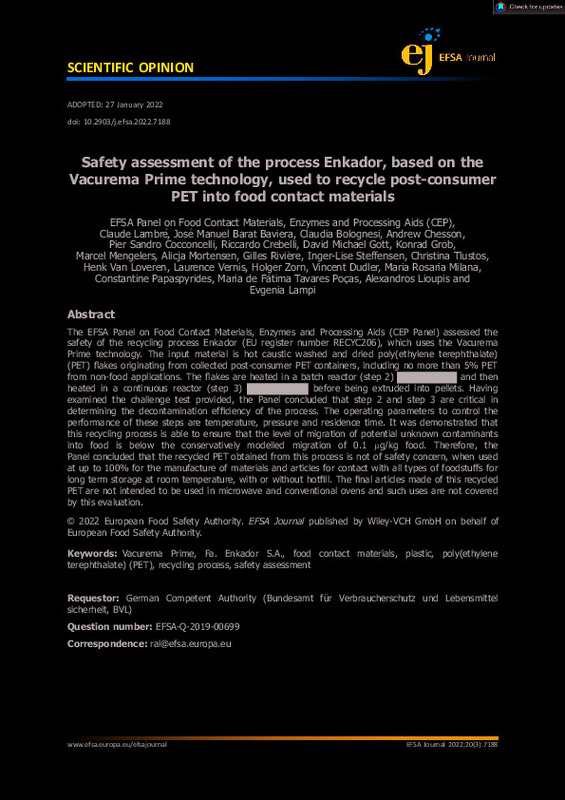JavaScript is disabled for your browser. Some features of this site may not work without it.
Buscar en RiuNet
Listar
Mi cuenta
Estadísticas
Ayuda RiuNet
Admin. UPV
Safety assessment of the process Enkador, based on the Vacurema Prime technology, used to recycle post-consumer PET into food contact materials
Mostrar el registro completo del ítem
Lambré, C.; Barat Baviera, JM.; Bolognesi, C.; Chesson, A.; Cocconcelli, PS.; Crebelli, R.; Gott, DM.... (2022). Safety assessment of the process Enkador, based on the Vacurema Prime technology, used to recycle post-consumer PET into food contact materials. EFSA Journal. 20(3):1-13. https://doi.org/10.2903/j.efsa.2022.7188
Por favor, use este identificador para citar o enlazar este ítem: http://hdl.handle.net/10251/193817
Ficheros en el ítem
Metadatos del ítem
| Título: | Safety assessment of the process Enkador, based on the Vacurema Prime technology, used to recycle post-consumer PET into food contact materials | |
| Autor: | Lambré, Claude Bolognesi, Claudia Chesson, Andrew Cocconcelli, Pier Sandro Crebelli, Riccardo Gott, David Michael Grob, Konrad Mengelers, Marcel Mortensen, Alicja Rivière, Gilles Steffensen, Inger-Lise Tlustos, Christina van Loveren, Henk Vernis, Laurence | |
| Entidad UPV: |
|
|
| Fecha difusión: |
|
|
| Resumen: |
[EN] The EFSA Panel on Food Contact Materials, Enzymes and Processing Aids (CEP Panel) assessed the safety of the recycling process Enkador (EU register number RECYC206), which uses the Vacurema Prime technology. The input ...[+]
|
|
| Palabras clave: |
|
|
| Derechos de uso: | Reconocimiento - Sin obra derivada (by-nd) | |
| Fuente: |
|
|
| DOI: |
|
|
| Editorial: |
|
|
| Versión del editor: | https://doi.org/10.2903/j.efsa.2022.7188 | |
| Agradecimientos: |
The CEP Panel of EFSA wishes to thank the following for the support provided to this scientific output: Stavroula Sampani. The Panel wishes to acknowledge all European competent institutions, Member State bodies and other ...[+]
|
|
| Tipo: |
|









